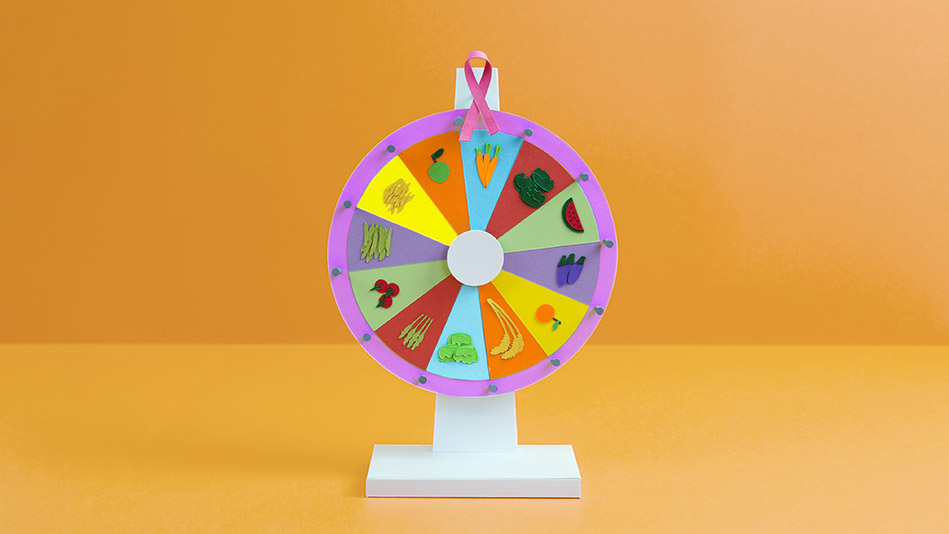How to Choose Healing Meals While Fighting Cancer
Nutrition plays a key role during and after breast cancer treatment. Here's how to fuel your body for a healthier life.

Illustration by Noelia Lozano
During Treatment: Eat Smarter
Dietitians are still underrepresented in cancer centers, says Jessica Iannotta, a certified specialist in oncology nutrition and chief operating officer of the cancer nutrition service Savor Health, so ask your doctor to refer you to one; she can provide valuable nutritional advice. Postmenopausal cancer patients, for instance, often take aromatase inhibitors, which keep estrogen low, to treat tumors and reduce the risk of recurrence. "But those drugs also reduce bone density, so you may need more calcium and vitamin D," says Iannotta.
Having nourishing meals on hand is also critical. "When you come home from chemo, you often just want to crawl into bed," says breast cancer survivor Wendy Watkins, board president of the Cancer Nutrition Consortium and vice president of corporate communications at Hormel Foods. "Many women don't have the energy to cook." Her experiences—and patient surveys—informed Hormel's new Vital Cuisine line of nutrient-rich shakes and heat-and-eat meals. (O testers think they're delicious.) And for those who lack access to healthy options—Avon-funded programs report food-insecurity rates of up to 60 percent among their metastatic breast cancer patients—some hospitals have food pantries. Says Carolyn Ricci, program director of the Avon Breast Cancer Crusade, "You can get treatment and pick up nutritious food."
After Treatment: Stay on Track
It can be tough to keep up the diet and exercise habits you began when you heard the word remission, but sticking to them matters. Research suggests that maintaining a healthy weight and staying active can improve long-term survival. Need an assist? Ask the Nutritionist: Recipes for Fighting Cancer is an app developed by Dana-Farber Cancer Institute dietitians with easy recipes and answers to common questions. You can even submit your own. Want to know whether it's safe to eat soy? Text away.
Dietitians are still underrepresented in cancer centers, says Jessica Iannotta, a certified specialist in oncology nutrition and chief operating officer of the cancer nutrition service Savor Health, so ask your doctor to refer you to one; she can provide valuable nutritional advice. Postmenopausal cancer patients, for instance, often take aromatase inhibitors, which keep estrogen low, to treat tumors and reduce the risk of recurrence. "But those drugs also reduce bone density, so you may need more calcium and vitamin D," says Iannotta.
Having nourishing meals on hand is also critical. "When you come home from chemo, you often just want to crawl into bed," says breast cancer survivor Wendy Watkins, board president of the Cancer Nutrition Consortium and vice president of corporate communications at Hormel Foods. "Many women don't have the energy to cook." Her experiences—and patient surveys—informed Hormel's new Vital Cuisine line of nutrient-rich shakes and heat-and-eat meals. (O testers think they're delicious.) And for those who lack access to healthy options—Avon-funded programs report food-insecurity rates of up to 60 percent among their metastatic breast cancer patients—some hospitals have food pantries. Says Carolyn Ricci, program director of the Avon Breast Cancer Crusade, "You can get treatment and pick up nutritious food."
After Treatment: Stay on Track
It can be tough to keep up the diet and exercise habits you began when you heard the word remission, but sticking to them matters. Research suggests that maintaining a healthy weight and staying active can improve long-term survival. Need an assist? Ask the Nutritionist: Recipes for Fighting Cancer is an app developed by Dana-Farber Cancer Institute dietitians with easy recipes and answers to common questions. You can even submit your own. Want to know whether it's safe to eat soy? Text away.



